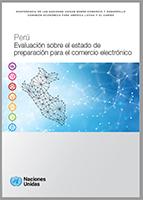
The eTrade Readiness assessment (eT Ready) of Peru, conducted by UNCTAD in collaboration with ECLAC, is the 34th assessment in the series and the first to be carried out in Latin America and the Caribbean. It provides a snapshot of the e-commerce ecosystem in Peru, identifies the challenges and opportunities for e-commerce development, providing guidance to stakeholders on how to translate the report findings into actions that will benefit Peruvian society.
The main findings are presented below by policy area:
- The Secretariat of Government and Digital Transformation (SGTD), under the Presidency of the Council of Ministers has a key role in enhancing the sustainability and effectiveness of the existing digital transformation governance model for e-commerce. Strengthening the SGTD's autonomy and technical capacity, fostering inter-institutional coordination, and public-private dialogue are vital for implementing the National Digital Transformation Policy across all e-commerce policy areas, particularly in developing private sector capabilities.
- Peru has made significant progress in deploying digital connectivity infrastructure and introducing regulatory reforms to encourage competition, reduce fees, and enhance quality.
- While the trade facilitation environment aligns with strategic objectives to boost Peru’s global integration, the e-commerce logistics market remains underdeveloped. Last-mile e-commerce logistics costs are high, inland shipments are limited, and delivery times need to be reduced to meet international standards.
- The Central Reserve Bank of Peru has been driving the modernization of the payment systems framework and encouraging financial institutions to offer cashless payment solutions, including electronic banking, credit and debit cards, digital wallets, and solutions that allow QR code payments. However, there is still potential for greater financial inclusion through electronic payment adoption.
- The legal and regulatory frameworks for e-commerce development are generally considered appropriate. A few specific gaps and vacuums need addressing, such as insufficient consumer protection in digital environments, issues related to taxation of digitally delivered trade, public procurement of cloud services, and the regulation of digital platforms, particularly those involved in delivery, mobility, tourism, and crowdfunding.
- Peru has a low illiteracy rate and possesses a higher level of ICT skills than the Latin America and the Caribbean average, but lower than OECD member countries in the region. Peruvian MSMEs are in the early stages of digitization with limited investment in ICT training due to financial constraints. In response, the government has designed a National Digital Talent Strategy to advance digital talent development, emphasizing diversity and an intercultural approach, and promoting women's participation in technology.
- Credit to the private sector in Peru is one of the highest in the region. Yet access inequalities persist, especially for MSMEs due to informality and financial unfamiliarity, limiting innovation financing. Additionally, digital credit and crowdfunding, as well the culture of open innovation in the corporate sector, are underdeveloped. There is also a lack of knowledge about investment alternatives and instruments.
The policy recommendations formulated in the assessment are expected to contribute to outlining a roadmap towards achieving priority objectives established in the National Digital Transformation Policy.
This assessment was made possible through the financial support of the E-commerce and Digital Economy Programme Core Donors (Germany, Switzerland, Sweden, and The Netherlands).


